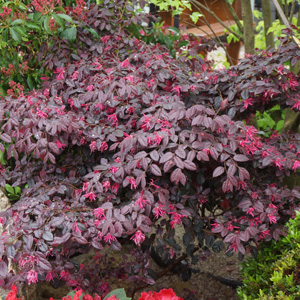Loropetalum Growing Guide

What is Loropetalum?
Loropetalum (Loropetalum spp.) also known as Fringe Flower is an evergreen shrub. It is part of the Hamamelidaceae family and is native to China and Japan. Loropetalum is naturally dense and forms a domed habit. There are two main forms of the Loropetalum, those with white to pale yellow flowers and green foliage and the pink-flowering varieties with deeper bronze and red foliage. The leaves are oval and hairy. The flowers are tassel like and bloom during Spring and Summer, at times into Autumn. Loropetalum like a full sun to part shade position in that garden that is sheltered from strong winds.
Benefits of Growing Loropetalum
Loropetalum are an easy to grow plant with minimal maintenance. They are very versatile and are ideal as a feature specimen, in a border, along drives or pathways or in rockeries as well as around pools. They can also be grown in tubs or pots. They make a pretty hedge. The weeping habit makes it ideal for Asian or Oriental style garden.
How to Grow Loropetalum
Climatic Zones
Cool to mild tropical.
Plant Size
Ground Cover Height: 50cm, Width: 1.5m
Shrub Height: 1.2-2m, Width: 1.2-1.5m
When To Plant Loropetalum
Plant anytime.
Soil Preparation
Plum Gorgeous grows well in most soils, as long as it’s well draining. They like organic matter so dig through well broken down compost before planting.
How To Plant Loropetalum
Plant in full sun to part shade, with the plant crown at soil level. Spacing will vary depending on part size.
Loropetalum Plant Care
Water well while the plant is establishing. Once established water requirements are low but do not allow to dry out over extended periods of heat.
Mulch annually to retain moisture.
Apply a general purpose slow-release fertiliser at the start of Spring.
No pruning is needed other than shaping to style. This can be done after flowering.







